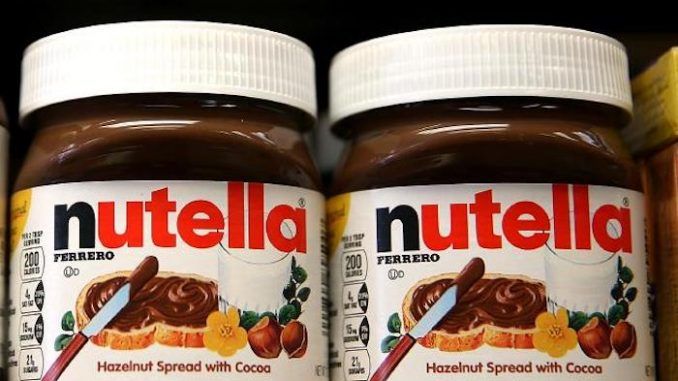
A new study conducted by the European Food Safety Authority (EFSA) has concluded that Nutella may be carcinogenic and therefore dangerous to consume.
The EFSA report states that palm oil, one of the key ingredients in the popular chocolate spread, can cause cancer when cooked at high temperatures.
Techtimes.com reports:

BYPASS THE CENSORS
Sign up to get unfiltered news delivered straight to your inbox.
You can unsubscribe any time. By subscribing you agree to our Terms of Use
Palm oil becomes likely cancer-causing when it is cooked at high temperatures, or around 200 degrees Celsius. When certain vegetables are refined, carcinogens glycidyl fatty acid esters (GE), 3-monochloropropanediol (3-MCPD), and 2-monochloropropanediol (2-MCPD) are created — with the highest levels of the substances found in palm oil and palm fats.
“For consumers aged three and above, margarines and ‘pastries and cakes’ were the main sources of exposure to all substances,” the EFSA said in a statement, which had no direct mention of Nutella.
Italian confectionery company Ferrero has fought back amid calls to boycott palm oil, a key ingredient of Nutella, and even launched an advertising campaign to assure the public about the safety of the well-loved product accounting for around one-fifth of their sales.
What’s in a jar of Nutella anyway?
Palm Oil
Palm oil gives Nutella its smooth texture as well as shelf life, with substitute products like sunflower oil potentially changing the product’s integrity, Ferrero said. Palm oil is the cheapest vegetable oil around at about $800 per ton versus $845 for sunflower oil.
Palm oil is such an affordable integral part of the chocolate and hazelnut spread that it could cost Ferrero up to $22 million more annually to replace the 185,000 tons they use every year, according to Reuters.
Back in May, the ESFA claimed that palm oil is carcinogenic and produced more of a likely carcinogen, specifically GE, than other vegetable oils when processed at temperatures exceeding 200 degrees Celsius.
The European Commission in 2014 commissioned the detailed study into GE after an EFSA probe the year before, identifying it as potentially harmful.
High temperatures remove palm oil’s red color and render its smell neutral, in an industrial process that Ferrero defends as right below 200 degrees Celsius and very low pressure to minimum contaminant levels.
EFSA, which does not possess regulatory powers, did not recommend consumers to stop consuming palm oil and noted that further research was necessary to assess risk.
Just last Dec. 7, a study partially funded by UK charity Worldwide Cancer Research pointed to a link between palm oil and rapid cancer spread in mice. Mouse subjects fed a high-fat diet and hefty amounts of palmitic acid, a major palm oil component, developed the most aggressive spread of cancer.
Other Nutella Ingredients
Apart from palm oil, Nutella contains sugar, hazelnuts (13 percent), fat-reduced cocoa (7.4 percent), skimmed milk powder (6.6 percent), whey powder or milk, and lecithin (soya) and vanillin as emulsifiers, according to the product website.
The spread is currently classified to have 546 kilocalories for every 100 grams, translating to 81 kilocalories per 15-gram servings.
Last November, the Food and Drug Administration (FDA) analyzed a Ferrero petition on reducing Nutella’s serving size from two tablespoons to one, as Americans seem to be using it more as a breakfast replacement for syrup and butter on packages, or paired with bread and fruit. The decision would slash in half the calories and the fat that one currently sees on the brand label.
The recent controversy that prompted an ad campaign from Ferrero and renewed interest on Nutella safety was sparked by the palm oil boycott of Italy’s biggest grocery chain, Coop. It was followed by the country’s largest baker eliminating the oil and bannering a “palm oil-free” label on its roster of products.


